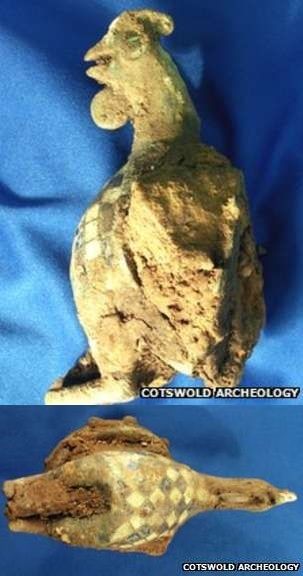Post by UKarchaeology on Jul 13, 2015 19:50:46 GMT

A Roman cockerel figurine thought to have been made to accompany a child's grave has been unearthed in Gloucestershire.
The 1,800-year-old enamelled object was found during an archaeological dig at one of Britain's earliest-known burial sites in Cirencester.
It is thought the bronze cockerel, which is 12.5cm high, could have been a message to the gods.
Archaeologist Neil Holbrook said it was a "most spectacular" find.
The elaborately-decorated cockerel is believed to be Roman, probably dating back to the 2nd Century AD.
According to experts, religious significance was given to the cockerel by the Romans and the artistic subject is known to be connected with Mercury, the messenger to the gods.
They said it was Mercury who was also responsible for conducting newly-deceased souls to the afterlife.
'Made in Britain'
Mr Holbrook, chief executive at Cotswold Archaeology, said the cockerel had been excavated from the grave of a young child and had been placed close to his or her head.
"Interestingly a very similar item was found in Cologne in Germany and it looks like they both could have come from the same workshop based in Britain," he added.
The object was discovered in early November and held back to allow the dig to continue uninterrupted.
It will now be cleaned, conserved, and possibly then displayed at the Corinium Museum in Cirencester.
Other finds from this grave include a small pottery tettine or feeding bottle, which was unfortunately highly fragmented. This will also undergo conservation work.
Excavations have been taking place at the former Bridges Garage on Tetbury Road in the town.
Earlier, experts said the unearthed burial site was the largest archaeological find in Cirencester since the 1970s.
(source: www.bbc.co.uk/news/uk-england-gloucestershire-16198947 )
